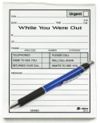VUSSC/Content/Tourism/Applying Effective Communication Skills/Telephone skills
Telephone Skills
The telephone (phone)is an important communication tool. It is very useful in the tourism industry, and sometimes, a tour guide communicates with people using the telephone. The way people handle the telephone gives the callers the first impression of the company or the individual. Therefore it is very important to know how to communicate properly on the telephone.
Basic principles for good telephone techniques
(A) When answering the telephone
- Have a pen and a paper close at hand.
- Always pick up the phone after 3 rings. Never let the caller wait or he/she may get angry.
- Greet according to the time of the day.
- Identify your enterprise and yourself.
- Ask if you could help - "How may I direct your call?"
- Listen to the caller.
B) Putting a caller on hold
- Ask permission.
- Wait for the caller’s response.
- Check back frequently if the line is still busy, to identify if the caller is prepared to wait.
C) Transferring calls
- Politely ask who is calling? For example: May I ask who is calling?
- Inform the caller that you are going to transfer the call.
- Explain the reason for the transfer.
- Alert the person who will receive the call.
D) Taking the message
- Record the date and time of the call.
- Record the caller’s full name.
- Record name of the caller’s company.
- Record the caller’s telephone number.
- Record the message and always reconfirm the message to the caller.
- Mark if the call is urgent, or what action is to be taken by the receiver.
- Record your name as you take the message.
E) Handling complaints through the phone
- Listen to the customer.
- Never argue with the customer.
- Speak professionally, not personally.
- Show empathy.
- Repeat the problem.
- Explain possible action(s) you can take.
- Enlist the caller in the decision of the action to be taken.
- Always thank the caller.
- If necessary, tell the caller when you will get back to him/her. Follow up.
F) Making a business call
- Plan your call, just as you would prepare for a speech.
- Know who you are going to call.
- Make a list of the main points you need to say.
- Have all the documents you will need during the conversation at hand, so that you do not have to leave the telephone.
G) Ending the call
- Always summarise the caller’s message to confirm that you understand his/her request.
- Thank the caller.
- Allow the caller to put down the phone first.
| Role Play
Do a role-play with a partner on making and answering a telephone call. Change roles when you have finished. Follow the procedure of good communication on the telephone that you have learned in this unit. You can ask a teacher or a trainer to supervise the role play and assess your telephone skills |
